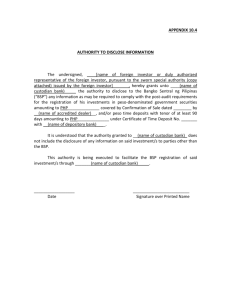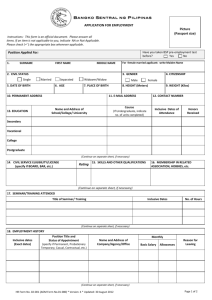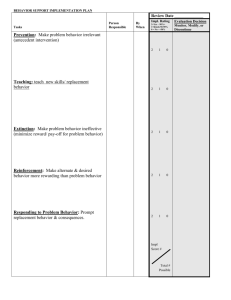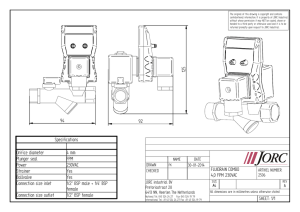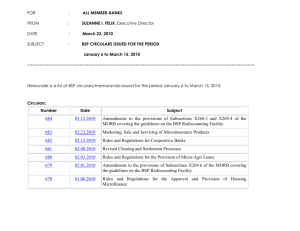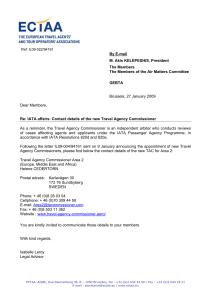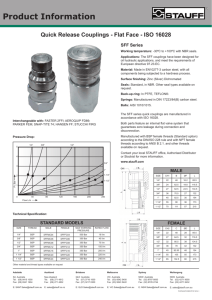CS_Administer_a_billing_&_settlement_plan
advertisement
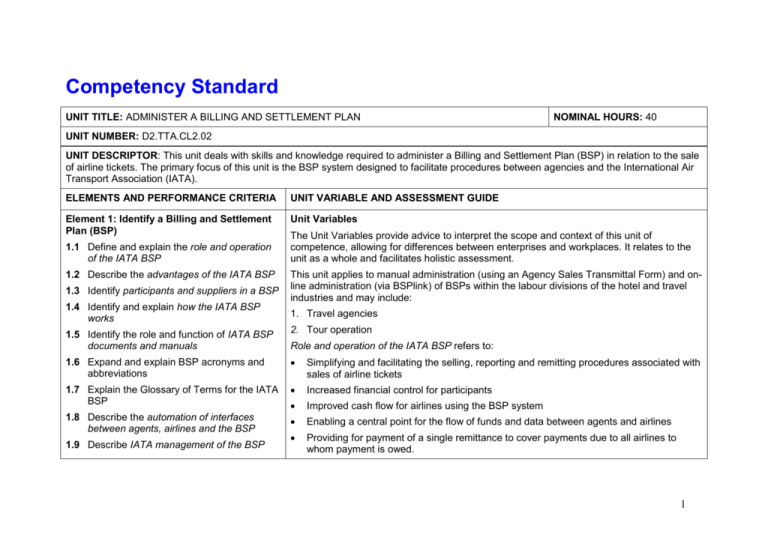
Competency Standard UNIT TITLE: ADMINISTER A BILLING AND SETTLEMENT PLAN NOMINAL HOURS: 40 UNIT NUMBER: D2.TTA.CL2.02 UNIT DESCRIPTOR: This unit deals with skills and knowledge required to administer a Billing and Settlement Plan (BSP) in relation to the sale of airline tickets. The primary focus of this unit is the BSP system designed to facilitate procedures between agencies and the International Air Transport Association (IATA). ELEMENTS AND PERFORMANCE CRITERIA UNIT VARIABLE AND ASSESSMENT GUIDE Element 1: Identify a Billing and Settlement Plan (BSP) Unit Variables 1.1 Define and explain the role and operation of the IATA BSP 1.2 Describe the advantages of the IATA BSP 1.3 Identify participants and suppliers in a BSP 1.4 Identify and explain how the IATA BSP works The Unit Variables provide advice to interpret the scope and context of this unit of competence, allowing for differences between enterprises and workplaces. It relates to the unit as a whole and facilitates holistic assessment. This unit applies to manual administration (using an Agency Sales Transmittal Form) and online administration (via BSPlink) of BSPs within the labour divisions of the hotel and travel industries and may include: 1. Travel agencies 1.5 Identify the role and function of IATA BSP documents and manuals 2. Tour operation 1.6 Expand and explain BSP acronyms and abbreviations Simplifying and facilitating the selling, reporting and remitting procedures associated with sales of airline tickets 1.7 Explain the Glossary of Terms for the IATA BSP Increased financial control for participants Improved cash flow for airlines using the BSP system 1.8 Describe the automation of interfaces between agents, airlines and the BSP Enabling a central point for the flow of funds and data between agents and airlines Providing for payment of a single remittance to cover payments due to all airlines to whom payment is owed. 1.9 Describe IATA management of the BSP Role and operation of the IATA BSP refers to: 1 Element 2: Comply with IATA BSP reporting procedures Advantages of the IATA BSP refers to: Simplification of reporting and payment procedures 2.1 Identify required submission dates Reduced time required compared to traditional billing and settlement procedures 2.2 Describe accountable transactions Cost-saving through the use of standardised documents and procedures including electronic transmissions 2.4 Complete Group Sales Summary Form (GSS) Increased financial and stock control 2.5 Process airlines’ own accounting memoranda Improved efficiency for businesses and passengers Links to the global distribution system (GDS) thereby reducing/eliminating potential for stock/ticket loss. 2.3 Complete AST form 2.6 Process Missing Traffic Document Report form Participants and suppliers in a BSP may include: 2.7 Process Returned Documents form IATA and BSP management Element 3: Comply with IATA BSP billings and statements requirements All airlines including IATA members and non-members All accredited IATA agents in the BSP country of operation Certain non-accredited IATA agents General (non-airline) sales agents and airport handling agents subject to nomination by the airline they represent and entry into the IATA standard agreement Data Processing Centre (DPC) Clearing Bank Standard Traffic Document Distributor Standard Traffic Document Security printer Automated Ticketing System Provider Other travel and tourism industry sectors. 3.1 Process Agents’ Billings 3.2 Process refund documentation Element 4: Comply with IATA BSP agents’ remittance procedures 4.1 Implement agents’ remittance procedures 4.2 Handle irregularities and defaults 2 How the IATA BSP works is described in the IAIA BSP Manual for Agents as, and under the following: Stage 1 Stage 2 Stage 3 Stage 4 Stage 5 Stage 6. IATA BSP documents and manuals include: Standard Traffic Documents (STDs): Automated Tickets – including Off-Premise Transitional Automated Ticket (OPTAT) and Off-Premise Automated Ticket/Boarding Pass Version 2 Electronic Tickets Multiple Purpose Documents (MPDs) Standard Administrative Forms (SAFs): Agency Sales Transmittal (AST) Refund Application/Authority and Refund Notice Standard Credit Card Charge Form (CCCF) Forms raised by airlines: Agency Debit Memo (ADM) Agency Credit Memo (ACM) BSP Calendar – indicating reporting periods, remittance dates and airline settlement dates BSP Manual for Agents 3 BSPlink Manuals Local Procedures/Information, as applicable to individual countries Need to maintain stocks of BSP documents, including identification of forms available online through BSPlink. Automation of interfaces between agents, airlines and the BSP refers to: BSPlink – including advantages and functions of BSPlink and automation requirements. IATA management of the BSP includes: Role of Industry Distribution and Financial Services (IDFS) BSP management Role of local BSP manager. Required submission dates should relate to: Annual BSP calendar Penalties for late submission Options for more regular reporting. Complete AST form involves adhering to IATA requirements as stated in the BSP Manual for Agents which may include: Completion Procedures Nil Entries “No Sales” Reports Recording Credit Transaction Issues in AST Calculation of face value Contents and Preparation of AST Timely submission 4 Automated Methods of Reporting Stapling of Documents Using AST Envelope. as well as: Compiling necessary documentation and information Checking for accuracy Ensuring all transaction details are recorded Reporting discrepancies Keeping and filing documentation in accordance with BSP requirements. Complete Group Sales Summary Form (GSS) involves adhering to IATA requirements as stated in the BSP Manual for Agents which include: Completion Procedures Reporting as well as Compiling necessary documentation and information Checking for accuracy Ensuring all transaction details are recorded Reporting discrepancies Keeping and filing documentation in accordance with BSP requirements. Process airlines’ own accounting memoranda refers to: Reporting of ADM/ACMs Disagreement procedure Processing of ADM/ACMs. Processes Agents’ Billings involves adhering to IATA requirements as stated in the BSP. 5 Manual for Agents which include: Billing Statement Billing Analysis Special Billings/Deferred Billing Dispatch of Billings Disputed Billings Statement of Annual Sales Volume and Traffic Document Usage Paying Computer Reservation System (CRS) Fees. Refund documentation must include: Refund Notice Refund Application/Authority. Implement agents’ remittance procedures refers to adhering to IATA requirements as stated in the BSP Manual for Agents which includes: Remittance Date, including requirements that apply to BSP participating Airlines and Non BSP participating IATA Member Airlines Method of Remittance/Direct Debiting Post-Settlement Errors Discovered By Agent Post-Settlement Errors Discovered By The BSP Airline Credit Notes Disputed Amounts Net Reporting/Remit Schemes as well as Compiling necessary documentation and information 6 Checking for accuracy Ensuring all transaction details are recorded Reporting discrepancies. Keeping and filing documentation in accordance with BSP requirements. Irregularities and defaults refers to: Incomplete/Overdue AST Late Reported/Unreported Transactions Overdue or Dishonoured Remittance Notices of Irregularity Default Action Reinstatement/Action Following the Default Administrative Charges Reviews by, and function of, Travel Agency Commissioner Arbitration. Assessment Guide The following skills and knowledge must be assessed as part of this unit: Understand the role of IATA in BSP Detailed knowledge of IATA agency accreditation requirements Ability to use the BSP manual and electronic procedures, including with BSPlink Ability to meet BSP reporting timeframes/calendars Ability to comply with BSP documentation in hard copy and electronic formats General knowledge relating to airfares and ticketing Arithmetic skills to enable calculations and report generation. 7 Linkages To Other Units Apply advanced airfare rules and procedures Construct and ticket domestic airfares Construct and ticket promotional international airfares Construct and ticket regular international airfares. Critical Aspects of Assessment Evidence of the following is essential: Demonstrated ability to comply with reporting procedures as required by IATA BSP Demonstrated ability to process billings and statements as required by IATA BSP Demonstrated ability to comply with agents’ remittance procedures as required by IATA BSP Demonstrated ability to handle irregularities and defaults as required by IATA BSP. Context of Assessment This unit may be assessed on or off the job: Assessment should include practical demonstration of administration of IATA BSP either in the workplace or through a simulation activity, supported by a range of methods to assess underpinning knowledge Assessment must relate to the individual’s work area or area of responsibility. Resource Implications Training and assessment to include access to a real or simulated workplace and use of actual IATA BSP systems including BSPlink, documents and procedures Access to workplace standards, procedures, policies, guidelines, tools and equipment. 8 Assessment Methods The following methods may be used to assess competency for this unit: Observation of practical candidate performance Simulated exercises Portfolio of reports and other relevant BSP documentation Oral and written questions Third party reports completed by a supervisor Project and assignment work. Key Competencies in this Unit Level 1 = competence to undertake tasks effectively Level 2 = competence to manage tasks Level 3 = competence to use concepts for evaluating Key Competencies Level Examples Collecting, organising and analysing information 2 Compile documentation and information required to process reports and comply with procedural requirements Communicating ideas and information 1 Discuss irregularities with others Planning and organising activities 2 Meet IATA calendar dates and schedules Working with others and in teams 1 Liaise with staff to compile report and other information; cooperate with others to investigate irregularities 9 Using mathematical ideas and techniques 1 Calculate and report settlement and billing figures Solving problems 1 Resolve disputes and irregularities Using technology 1 Use the computerised reservation system and BSPlink 10
